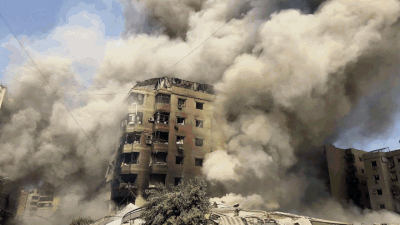The Israeli military announced on Sunday that the airstrike responsible for the death of Hezbollah leader Hassan Nasrallah in Beirut earlier this week also resulted in the elimination of more than 20 additional members of the Lebanese armed group.
“More than 20 other terrorists of varying ranks, who were present at the underground headquarters in Beirut located beneath civilian buildings, and were managing Hezbollah’s terrorist operations against the state of Israel, were also eliminated,” the military said, providing a list of some of the individuals.
Here are the latest developments from the Israel-Hezbollah conflict:
Former Hezbollah leader Nasrallah’s body recovered ‘intact’
The remains of Hezbollah leader Sayyed Hassan Nasrallah have been found at the location of an Israeli air strike on the southern suburbs of Beirut. News agency Reuters reported that his body was recovered intact.
The Israeli military on Friday struck multiple bunkers of Hezbollah inside Lebanon, confirming the death of Hezbollah leader Hassan Nasrallah, a claim later verified by the Lebanese militant group.
While Hezbollah’s statement on Saturday confirming Nasrallah’s death did not say how exactly he was killed nor when his funeral would be, the sources indicated that Nasrallah’s body showed no signs of direct wounds. They suggested that the likely cause of death was blunt trauma resulting from the force of the explosion.
A statement released by Hezbollah on Saturday said Nasrallah “has joined his fellow martyrs.” Hezbollah vowed to “continue the holy war against the enemy and in support of Palestine.”
The attack reportedly involved around 85 “bunker-buster” bombs, designed to penetrate deep underground before exploding. Bunker Buster bombs, also known as ground penetration munitions, are heavyweight weapons ranging from 2,000 to 4,000 pounds. These bombs are designed to penetrate deep into the earth or through reinforced concrete structures.
The use of Bunker Buster bombs in areas with high population density is prohibited under the Geneva Convention, due to the high risk of civilian casualties.
Israel’s ‘precise’ strike
Nasrallah, who had been at the helm of Hezbollah for over three decades, is the most significant target to be eliminated by Israel during the recent escalation of hostilities with the group. The Israeli military said that it executed a precise airstrike on Friday, while Hezbollah’s leadership was convening at their headquarters in Dahiyeh, located in the southern part of Beirut.
The Lebanese health ministry said six people were killed and 91 injured in the Beirut strikes, which leveled six apartment buildings.
Israel tracked Nasrallah for months
Israel had known about Nasrallah’s location for months before launching the fatal strike, New York Times quoted three Israeli officials as saying. The decision to strike Nasrallah was made recently, without informing the US. Jerusalem feared that the window of opportunity to eliminate him would close.
Hashem Safieddine, a relative of Nasrallah and a potential future leader, was not present at the bunker in Beirut that was targeted, according to three officials.
High-ranking officials from the Israeli Air Force reported on Saturday that the operation was carried out flawlessly, without any mistakes or hostile fire directed at their aircraft.
“Everything we planned was executed precisely, with no errors, both in intelligence, the planning, with the planes, and the operation itself. Everything went smooth,” said the commanding officer of the Israeli Air Force’s 69th squadron while speaking to journalists.
US backs Israel
US President Joe Biden referred to the Israeli airstrike that killed Hassan Nasrallah, as a “measure of justice” for his decades-long campaign of terror.
The president pointed out that the operation against Nasrallah occurred within the wider context of the conflict that was initiated by Hamas’ killing of Israelis on October 7, 2023. Biden said, “Nasrallah, the next day, made the fateful decision to join hands with Hamas and open what he called a ‘northern front’ against Israel.”
Iran calls for UNSC meeting
In a letter addressed to the United Nations Security Council, Iran’s UN ambassador Amir Saeid Iravani called for an urgent meeting of the council’s 15 members to discuss Israel’s recent actions in Lebanon and the surrounding region, particularly in light of the killing of Hezbollah leader Sayyed Hassan Nasrallah by Israeli forces.
“The Islamic Republic of Iran strongly warns against any attack on its diplomatic premises and representatives in violation of the foundational principle of the inviolability of diplomatic and consular premises and reiterates that it will not tolerate any repeat of such aggression”, the ambassador said.
Moreover, Iravani asserted Iran’s readiness to take all necessary measures to protect its crucial national and security interests. In his letter, he wrote, “Iran will not hesitate to exercise its inherent rights under international law to take every measure in defence of its vital national and security interests.”
Israel vows to keep up attacks on Hezbollah
Israel announced on Sunday that it was conducting fresh air strikes against numerous Hezbollah targets within Lebanon, following the assassination of the group’s leader, Hassan Nasrallah, who was backed by Iran.
The Israeli military stated that it had “attacked dozens of terrorist targets in the territory of Lebanon in the last few hours,” focusing on facilities housing weapons and military infrastructure belonging to Hezbollah.
Since Saturday, the Israeli military has claimed to have struck hundreds of Hezbollah targets across Lebanon, with the aim of crippling the organization’s military capabilities and infrastructure.
Israel’s chief of staff, Lt gen. Herzi Halevi, said that the killing of Nasrallah was “not the end of our toolbox”.
